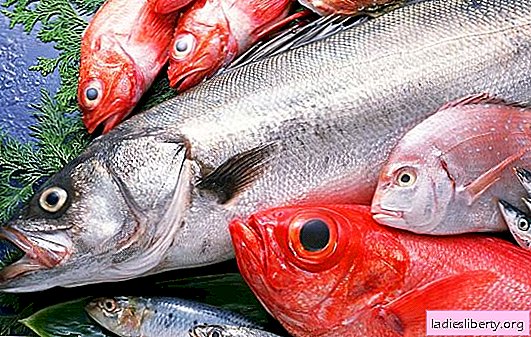
Those who adhere to the principles of a healthy diet need to include fish in their diet. It is considered one of the best sources of vitamins and protein, as well as polyunsaturated fatty acids and beta-carotene, which are the "building material" for cells.
It has long been known that saltwater fish are more beneficial than poultry or meat. And in regions where this product regularly appears on the table, people are much less likely to suffer from cardiovascular diseases.
Useful microelements and calorie content of sea fish
The beneficial effect of sea fish on the state of the human body is due to the high content of a number of useful substances, namely:
• vitamins of groups A, D, E, F;
• various amino acids;
• lysine;
• methionine;
• tryptophan;
• polyunsaturated fatty acids (omega-3 and omega-6).
Due to this composition, sea fish are more beneficial than river species. In addition, it is a source of the following elements:
• fluorine;
• zinc;
• magnesium;
• manganese;
• lithium;
• calcium;
• boron;
• iodine;
• bromine;
• phosphorus;
• iron;
• copper.
Most of the varieties of marine inhabitants can be considered low-calorie, since 100 g of the product contains only 91 kcal. Depending on the variety, "sea meat" contains:
• from 14 to 20% protein;
• from 2 to 3% fat;
• from 0.1 to 0.5% carbohydrates.
Other advantages of marine fish include the fact that it is easily absorbed by the body and digested within 1.5-2 hours, whereas after eating pork or beef this process will take twice as long.
Sea fish: what is the use of this product?
The regular use of seafood allows you to achieve the following positive results:
• normal functioning of the digestive system due to easy assimilation of the product;
• the condition of the thyroid gland improves due to the high iodine content;
• the risk of tumor diseases and inflammatory processes is reduced due to the restoration of the balance of vitamins B, E and unsaturated acids;
• the level of cholesterol in the blood is stabilized;
• the cardiovascular system is restored and the likelihood of heart attacks and strokes is reduced, since marine fish contains a sufficient amount of potassium;
• increased brain activity;
• improves vision, thanks to vitamins A and B 2.
And also the consumption of fish allows you to get rid of extra pounds, since this product contains a small amount of calories. In addition, scientists have long established that residents of coastal areas who are able to regularly eat seafood have a longer life expectancy than "meat-eaters."
Contraindications to consumption
Like any product, fish is not useful to everyone. It should not be eaten in such cases:
- The presence of allergies. Since the "meat" of marine inhabitants contains a large amount of protein, this often provokes negative manifestations in people with increased sensitivity to this component.
- High thyroid activity. Sea fish contain a large amount of iodine, which acts as a stimulant for the endocrine system, which exacerbates the problem with violations of this kind.
In these situations, sea fish can cause significant harm to the human body and significantly worsen their health.
Sea fish: possible product harm
In some cases, sea fish can harm a healthy person even in the absence of any contraindications to its use. This product may lose its beneficial properties under the influence of the following factors:
- Contaminated water bodies. Every year the environmental situation in the world only worsens, tons of industrial waste, including quite toxic ones, are dumped into the seas and oceans. Underwater inhabitants absorb harmful substances, as a result of which marine fish may contain mercury, cadmium, lead, arsenic and a number of other dangerous elements that can cause significant harm to the health of a person who consumes such a product.
- Fish disease. Sea water is the habitat of a number of dangerous bacteria and helminths that parasitize in the body of fish. When eating sick individuals in food, the probability of infection is high.
- The use of chemicals during cultivation. When marine fish is kept in a firm, hormones are often used to stimulate rapid growth. The components of these substances remain in the organs and tissues of individuals and are often dangerous to humans.
- Freezing and subsequent defrosting. In areas far from the coast, it is impossible to purchase fresh sea fish, during long-term transportation the product undergoes freezing, and often this happens repeatedly. As a result, the "meat" of marine life loses most of its nutrients.
In other words, fish grown in adverse conditions or repeatedly frozen and thawed will, at best, lose their beneficial properties, and at worst - will harm the human body.
What kinds of sea fish are the most healthy?
Dietitians recommend introducing into the diet the following varieties of inhabitants of salt ponds in the absence of contraindications:
• pollock;
• hake;
• cod;
• sea trout;
• salmon;
• catfish;
• marine language;
• tilapia;
• tuna.
In limited quantities, fish species such as mackerel and halibut should be consumed. A shark, swordfish and sea bass should be excluded from the diet.
How to choose a fish?
So that eating marine fish does not harm the body, you should know how to choose it correctly. Before you make a purchase, you need to pay attention to the following points:
- A store. Like any product, it is better to buy fish in large supermarkets, and not "from the car" near the metro station or bus stop. This is due to the fact that in the first case, the product passes sanitary control and is usable, and dubious outlets are not responsible for the quality of the products.
- Fish size. The larger the individual, the older it is, and when the hake or pollock was caught in an ecologically unfavorable area, during the course of its life it absorbed many harmful substances. For this reason, you should choose carcasses of small and medium size, as young fish contain less toxins than the inhabitants of the seas of old age.
- Eyes of an individual. If the fish is of high quality, the eyes will be clear and shiny, and the presence of spots and opacities on the mucous membrane indicates dubious freshness of the product.
- Gills. The respiratory organs of a healthy and recently caught individual have a dark red color and a uniform surface, and the presence of mucus on them indicates that the inhabitant of the seas left her native body of water for a long time.
- Leather and scales. On the body of the fish, a certain amount of mucus is permissible, which should be colorless and free from odors. Otherwise, eating such a product threatens poisoning.
- The elasticity of the carcass. With light squeezing, there should not be any traces or dents on the body of the fish, a fresh and high-quality product is characterized by the ability to quickly restore its shape.
After acquiring the carcass, another “freshness test” should be carried out at home. To do this, lower it in a bucket of water. If the product is fresh, the fish will remain at the bottom, and in cases where it has been caught long ago, the body will immediately emerge.
To get the most out of marine fish, it is important to combine it with other products. Vegetables and mushrooms are best suited for salmon, catfish, tuna and other varieties, and lemon sauce will add a unique taste and piquancy to the dish.











